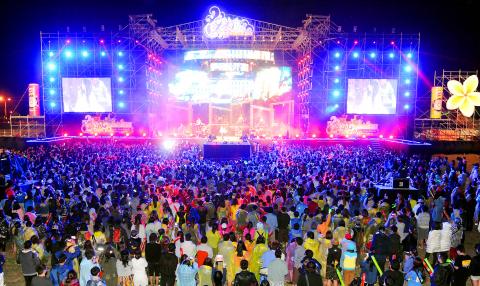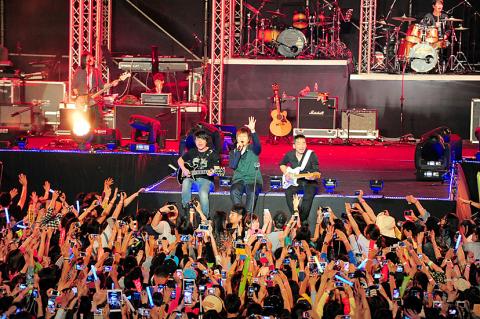Music venues are one sector that would be opened to Chinese investment by passage of the trade pact, and with concerts, parties and events at a virtual standstill for the past three weeks as both promoters and the youth that form their main audiences were camped out around the Legislature, this came up for discussion and scrutiny. There are serious concerns that Chinese ownership — even part ownership — of music venues would result in censorship in Taiwan.
For Taiwan’s pop musicians, Chinese censorship is already a reality. China regularly punishes Taiwan’s top pop stars with performance bans, radio bans, online attacks meant to destroy an artist’s fan base and other means of control. The crimes that trigger these bans range from singing Taiwan’s national anthem in public (as A-Mei (阿妹) famously did more than a decade ago — much to the chagrin of Chinese authorities) to Facebook posts that even vaguely displease China’s government.
Speaking on a stage outside the Legislature on March 25, singer Ying Wei-min (應蔚民) addressed this issue head on, saying, “If the commercial situation is affected by political factors, how is it that independent music will not also be affected? It most definitely will be, and even more seriously. ”

Photo: TT and courtesy of Ying wei-min
Ying became famous after playing a major role in the hit film Cape No. 7 (海角七號), and has been performing for nearly two decades as leader of an indie band called The Clippers (夾子電動樂隊). He spends one or two weeks each year performing in China, and has seen Chinese musician friends subjected to police surveillance or banned from public performance for criticizing the government.
Ying once posted one of his own performances on China’s biggest streaming video Web site, Tudou, but “within 10 minutes it was taken down, because the content did not accord with the norms of a caring society,” he said.
The cross-strait service trade pact, among its three provisions for opening up the entertainment industry, would allow Chinese investors to buy up to 49 percent of music performance venues or theaters for live performances. Though Chinese could not own a controlling interest in these venues, Ying argues that this level of ownership would have dire political consequences, as Chinese shareholders would be able to influence content.

Photo: TT and courtesy of Ying wei-min
Hypothetically speaking, if a Taiwanese singer supported Tibetan freedoms, the Dalai Lama, Taiwanese independence or was critical of China — and a huge number of indie musicians in Taiwan do — Chinese investors could tell their Taiwanese counterparts that allowing such artists to perform would have adverse effects on business. If the Taiwanese live house is connected to other music venues in China, this threat has real teeth, especially if the venues in China earned most of this hypothetical group’s income. The effect would be censorship of free speech in Taiwan’s theater and music circles.
Given that Taiwan’s pop music industry has completely caved in to the Chinese Communist Party, the scenario is not very far-fetched. Adding to Taiwan’s vulnerability would be its small market size. There are really only two live houses of commercial significance in all of Taiwan, The Wall and Legacy. Control of one major venue, would have far reaching effects.
“We can see Mayday and some Taiwanese singers have been banned in China for supporting the protests against the services trade agreement,” said Ying. “So to this I must say, as an artist or singer or performer in Taiwan’s music circles, this result tells us something very simple. It tells us that there can be no free trade without political repercussions. So in any cooperation with China, we absolutely must remember this.”

Photo: TT and courtesy of Ying wei-min
CONGRATS TO SPRING SCREAM
I would say that this audience not only remembered the threat from across the Taiwan Strait, they were fairly preoccupied with it. So were the media, and the rest of Taiwan. It was easy to forget that last weekend was also the 20th incarnation of Spring Scream, which only made a few mentions in the news — the journos seemed more preoccupied with such important issues as what brand of socks the student leaders at the legislature were wearing. Nevertheless, congratulations are in order to Spring Scream and its organizers Jimi Moe and Wade Davis for making it this long, and also helping to kickstart a musical and social transformation of Taiwan. Without events encouraging self-expression, as Spring Scream has done over the past 20 years, it would be difficult to imagine the Sunflower Movement happening in Taiwan today.
Even so, Spring Scream founder Jimi Moe told the Apple Daily that he felt “tired.” The tabloid quoted him as saying, “After 20 years, maybe we should think about whether it’s time to stop.” Later in the interview he however said, “We will definitely keep going.”
As for the numbers, the town of Kenting received around 200,000 individual visits last weekend over the holiday weekend, with as many as 100,000 individual visits on a single day. The crowds were attracted by at least six separate concerts and musical events, including Spring Scream, Spring Wave, Free the Beach and others. Visitors spent more than NT$ 200 million in the area, according to media reports.

April 14 to April 20 In March 1947, Sising Katadrepan urged the government to drop the “high mountain people” (高山族) designation for Indigenous Taiwanese and refer to them as “Taiwan people” (台灣族). He considered the term derogatory, arguing that it made them sound like animals. The Taiwan Provincial Government agreed to stop using the term, stating that Indigenous Taiwanese suffered all sorts of discrimination and oppression under the Japanese and were forced to live in the mountains as outsiders to society. Now, under the new regime, they would be seen as equals, thus they should be henceforth

Last week, the the National Immigration Agency (NIA) told the legislature that more than 10,000 naturalized Taiwanese citizens from the People’s Republic of China (PRC) risked having their citizenship revoked if they failed to provide proof that they had renounced their Chinese household registration within the next three months. Renunciation is required under the Act Governing Relations Between the People of the Taiwan Area and the Mainland Area (臺灣地區與大陸地區人民關係條例), as amended in 2004, though it was only a legal requirement after 2000. Prior to that, it had been only an administrative requirement since the Nationality Act (國籍法) was established in

With over 80 works on display, this is Louise Bourgeois’ first solo show in Taiwan. Visitors are invited to traverse her world of love and hate, vengeance and acceptance, trauma and reconciliation. Dominating the entrance, the nine-foot-tall Crouching Spider (2003) greets visitors. The creature looms behind the glass facade, symbolic protector and gatekeeper to the intimate journey ahead. Bourgeois, best known for her giant spider sculptures, is one of the most influential artist of the twentieth century. Blending vulnerability and defiance through themes of sexuality, trauma and identity, her work reshaped the landscape of contemporary art with fearless honesty. “People are influenced by

The remains of this Japanese-era trail designed to protect the camphor industry make for a scenic day-hike, a fascinating overnight hike or a challenging multi-day adventure Maolin District (茂林) in Kaohsiung is well known for beautiful roadside scenery, waterfalls, the annual butterfly migration and indigenous culture. A lesser known but worthwhile destination here lies along the very top of the valley: the Liugui Security Path (六龜警備道). This relic of the Japanese era once isolated the Maolin valley from the outside world but now serves to draw tourists in. The path originally ran for about 50km, but not all of this trail is still easily walkable. The nicest section for a simple day hike is the heavily trafficked southern section above Maolin and Wanshan (萬山) villages. Remains of